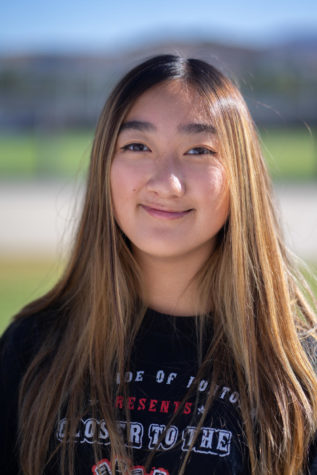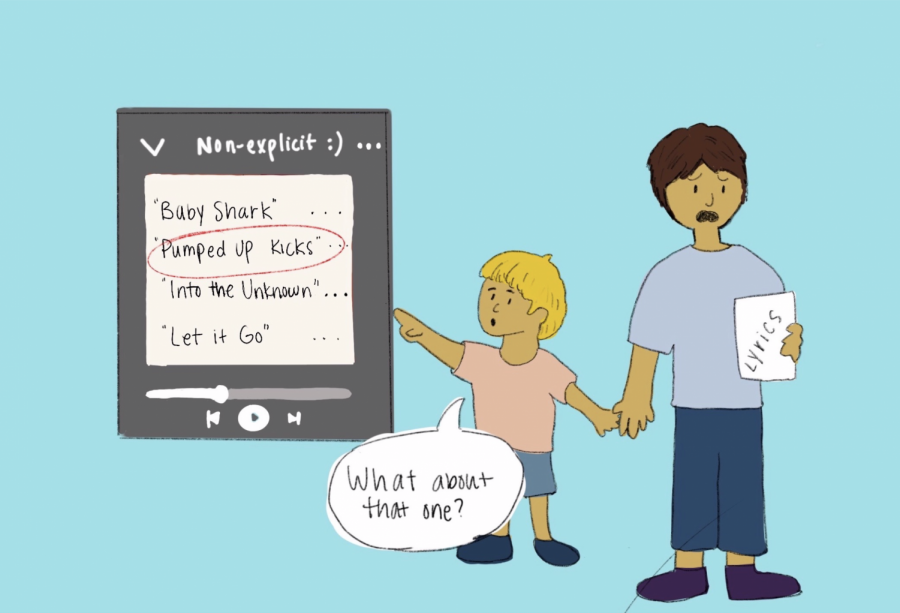Music Should be Rated by Lyrics, not Language
With the current music rating system, songs like Foster the People’s “Pumped Up Kicks,” which express the ambition to start a school shooting, are in the same category as childrens’ songs like “Baby Shark.” As a result of this lyrical neglect, thousands of songs with vastly different messages and levels of intensity are grouped together under the blanket terms of either “explicit” or “non-explicit.”
Eminem’s recent album, “Music to be Murdered By,” has sparked controversy around age-restricted content. In his track “Darkness,” he portrays the Manchester Arena bombing from the perspective of the shooter, alluding to controversial events such as 9/11.
Currently, music is only categorized as explicit or non-explicit. This rating system entirely neglects the lyrical content, which means a song encouraging violence could be branded as safe for everyone to hear as long as it does not include profanity.
“I think the definition of explicit can be very different and diverse depending on the age group,” junior Madison Empalmado said. “For example, if you have a song full of cuss words, then an older generation of people are more prone to dislike it.”
Considering the broad range of music available, it is time to implement a more specific rating system to make it easier to regulate what younger audiences listen to and are influenced by. With the number of explicit Billboard 100 chart toppers over 833 percent higher than in 2001, according to Billboard, it is crucial that people get a better idea of what they listen to.
For example, despite the upbeat rhythm and lack of curse words in a song like Foster the People’s “Pumped up Kicks,” the lyrics revolve around violence and the ambition to start a school shooting. Conversely, many who are turned away by the harsh tones of entire genres of music, such as rock or rap, may overlook positive messages in the lyrics. In particular, Logic’s “Black Spiderman,” despite the occasional use of profanity for emphasis, has a strong focus on racial inclusion and self acceptance.
“I think the purpose of the music industry is for artists to share their message and share their story,” Empalmado said. “Right now, the organization prevents certain stories from being told because it’s marked as explicit.”
Without a proper rating system that takes lyrical meaning into consideration, children are constantly exposed to songs with dark messages under the impression that they are child-friendly, and people easily misinterpret the nature of songs.
The Motion Picture Association of America film rating system, which dictates the viewer suitability for movies, is divided into G, PG, PG-13 and R, which respectively mean general audiences, parental guidance, parents strongly cautioned and restricted. A system like this one is far more effective in not only categorizing content, but also guiding parents toward which content is safe for children.
A more reasonable system would divide songs into youth, general, explicit and intense categories based on the lyrics and intended audience. Songs created solely for children, such as “Baby Shark,” would fall into the youth category. Tracks lacking profanity and sinister messages fall into the general audience category, such as Coldplay’s “Viva la Vida.” Explicit would include songs with milder profanity or underlying dark imagery, with the intense category reserved for songs with both profanity and dark or violent themes.
This new system would make it much simpler to filter through songs and distinguish which songs are safe for which audiences. Songs like “Pumped up Kicks” would become explicit despite lacking profanity, and songs like Eminem’s “Darkness” would be labeled intense for the dark symbols and imagery as well as the swear words.
“It’s not just Eminem. A lot of rap songs are marked under explicit for cursing, but at the same time they also talk about a lot of really bad stuff,” junior Ashwin Kunaseelan said. “It’s up to parents to know what’s right for their kids to listen to.”
Your donation will support the student journalists of Portola High School. Your contribution will allow us to purchase equipment and cover our annual website hosting costs.

Akshay Raj is your co-editor-in-chief of the Portola Pilot this year. In his final year as Portola Pilot staff, he is beyond excited to help bring...

Manan Mendiratta is the Sports Editor for the 2019-2020 school year. This is Manan’s first time in the Portola Pilot, so he is extremely excited to contribute...

Annie Qiao is your 2019-20 Arts & Entertainment Editor for her fourth year at the Pilot! As a passionate admirer of the arts, she hopes to bring a...




